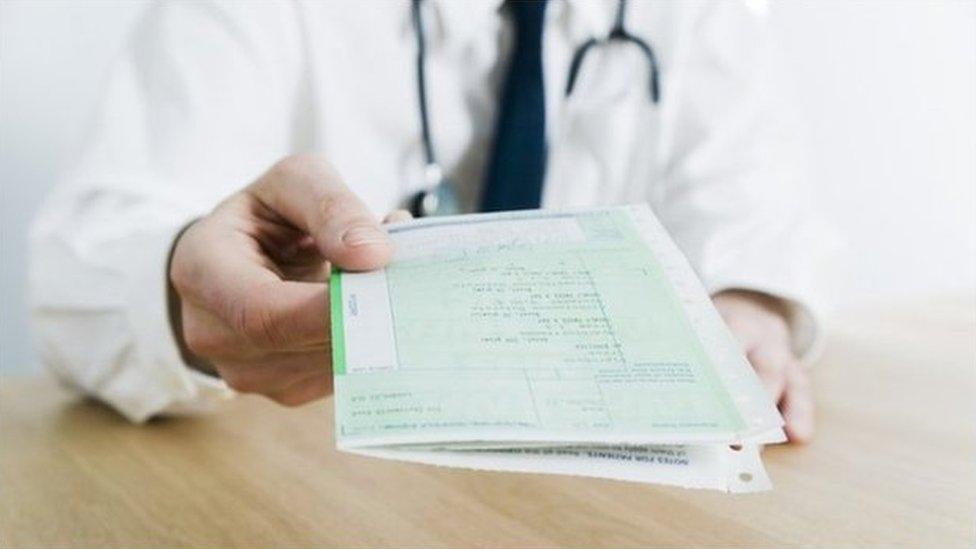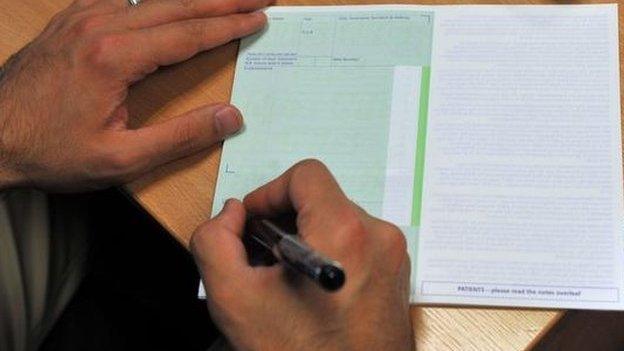GPs being paid to cut patient referrals
- Published
GPs being paid to cut patient referrals
Some doctors in England are being offered thousands of pounds to cut the number of patients being sent to hospital, an investigation has found.
GP practices are being paid to help local NHS groups limit the number of patient referrals and cut costs, the doctors' magazine Pulse found., external
Appointments affected include scans and consultations with specialists - including those for cancer patients.
The British Medical Association said such incentives were "misguided".
At least nine clinical commissioning groups (CCGs) were offering GP practices payments for hitting targets, according to Pulse's investigation.
In one case, Birmingham South Central CCG was offering practices more than £11,000 to reduce new outpatient attendances, follow-ups, A&E attendances and emergency admissions by 1%, compared with 2014/15.
It said the schemes, which exclude cancer referrals, were designed to "incentivise best quality practice" and "drive improvements in the quality of primary medical care".
"Our priority is to ensure that patients have access to services that they need, when they need them," said a spokesperson for Birmingham South Central CCG.
Another CCG told Pulse it had considered the "full impact" of the incentive scheme and was "confident that there is no conflict of interest".

In November GPs in England were encouraged to nearly double the number of patients referred to hospital for cancer tests
Pulse said that one scheme had already been looked at by the General Medical Council, the body which regulates medical standards in the UK, after local GP leaders expressed their concern.
The magazine pointed out that initial hospital referrals for cancer patients should happen within two weeks of a GP first suspecting the condition.
'Short-sighted'
Dr Chand Nagpaul, chairman of the GPs committee of the doctors' trade union the British Medical Association, told BBC Radio 4's Today programme that such schemes were a "financial contaminant" to patient-doctor trust.
He said: "It's short-sighted and misguided of CCGs to introduce such mechanisms, because they do lead to the potential for patients questioning the motives of GP referrals.
"We believe it is far more appropriate for CCGs to introduce clinical pathways that ensure patients are referred appropriately rather than these crude, salesman-like bonuses which pay GPs simply to make reduction to referrals in numerical terms."
Dr Peter Melton is local GP and clinical chief officer for North East Lincolnshire CCG, which offers the equivalent of more than £6,000 to practices that reduce outpatient referrals to the same level as the 25% with the lowest referral rates (which include two-week urgent cancer referrals) in 2014/15.
He said the CCG was already among the best in England for referring suspected cancer patients to a consultant within two weeks and the scheme was not about avoiding sending people to hospital.
"It is not focussing on referral reduction per se but on better clinical and quality standards for the patient," he explained.
"The expectation is practices will be encouraged to investigate more locally and monitor the patient in the first instance rather than automatically refer in to a secondary care service."

Analysis by the BBC's Helen Briggs
The NHS is under pressure to make savings, with a target of carving out £22bn of efficiency savings by 2020.
NHS leaders want to cut patient referrals that are deemed inappropriate, particularly when patients could be cared for locally.
Clinical Commissioning Groups (CCGs) are groups of GPs that work together to plan and design local health services.
There are more than 200 CCGs across England and, according to Pulse, at least nine are offering payments for keeping within targets for outpatient referrals and follow ups. It is not clear how extensive the practice is elsewhere.
Some have questioned the wisdom of the move, saying patients could miss out on vital care. But CCGs have defended their stance, saying it is about good practice, not about keeping people who need treatment out of hospital.

'Over-stretched'
In November the NHS advisory board said GPs in England should nearly double the number of patients referred to hospital for cancer tests.
The National Institute for Health and Care Excellence said delays in spotting symptoms could be costing thousands of lives each year.
NHS England said: "We explicitly want to increase not deter appropriate referrals for cancer checks."
Dr Rosie Loftus of the charity Macmillan Cancer Support, external described the findings outlined in Pulse as "very worrying".
"This is yet another sign of an NHS which is seriously over stretched and not giving GPs the resources and support they need," she said.
NHS Lambeth Clinical Commissioning Group, which offers payments for practices moving towards the average referral rate, said, like all CCGs, it wanted to reduce the number of patients being sent to hospitals unnecessarily.
"The part of the payment relating to the rate of referrals is a small part of the funding and is not designed to stop GPs referring patients who have a clinical need for hospital treatment such as cancer patients," said a spokesperson.
Related topics
- Published4 July 2015

- Published18 August 2015
